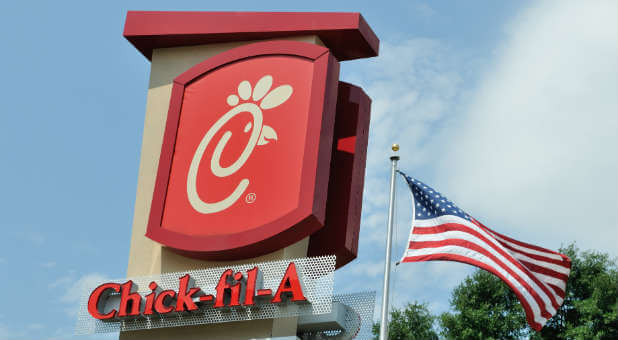The only food on Chick-fil-A’s menu I normally eat is the grilled market salad, since I’m watching my weight. But today I feel like ordering dozens of chicken sandwiches with waffle fries to share with friends. Why? Chick-fil-A is again under scrutiny because of its Christian values.
A few days ago, The New Yorker magazine published an astonishingly prejudiced assault on Chick-fil-A by writer Dan Piepenbring. The article bemoaned the fact that Atlanta-based Chick-fil-A has opened its fourth restaurant in Manhattan, and—horrors—thousands of sophisticated New Yorkers are standing in long lines to eat there.
The newest location on Fulton Street is the company’s largest store—12,000-square-feet on five floors. But The New Yorker believes something sinister lurks behind the charming red-and-white façade of this Atlanta-based business. Piepenbring says Chick-fil-A’s arrival in New York City “feels like an infiltration” because of the company’s “Christian traditionalism.” He says the restaurant has the “homespun ambiance of a mega-church.”
Piepenbring adds that “there is something especially distasteful about Chick-fil-A” because the company’s stated corporate goal is “to glorify God.” He notes that the restaurant chain is closed on Sundays for religious reasons, and that there is a statue of Jesus washing a disciple’s feet inside Chick-fil-A’s headquarters in Georgia. All this, Piepenbring says, is “creepy.”
I suppose this information is supposed to make intelligent New Yorkers gag on their chicken nuggets. But so far they haven’t gotten the message. These chicken sandwiches must taste really good. Meanwhile The New Yorker, which I love to read for its biting cultural commentary and very funny cartoons, has just resorted to outright bigotry.
Chick-fil-A got in hot water a few years ago when the media reported that founder S. Truett Cathy, and his son, Dan Cathy, support traditional marriage. An effort was made to demonize Chick-fil-A as anti-gay. In 2012, Chicago mayor Rahm Emanuel said he would ban Chick-fil-A from opening a store in his city because Dan Cathy said he supports “the biblical definition of a family unit.”
Then, in 2016, New York City mayor Bill de Blasio urged New Yorkers not to eat at Chick-fil-A because of its “anti-LGBT” stance. His message apparently didn’t stop New Yorkers from thinking for themselves. Today, in just one of Chick-fil-A’s locations in New York City, a chicken sandwich is sold every 6 seconds.
Why the hostility? Chick-fil-A doesn’t discriminate against homosexuals—or anyone else who orders its sandwiches, chicken nuggets or milkshakes. It does support Winshape Marriage, a ministry designed to help couples avoid divorce. Because Chick-fil-A’s founders are Baptists, Winshape’s marriage retreats are only for heterosexual couples.
I am struggling to understand why some people would attack Chick-fil-A because its founders have certain religious views. The company does not discriminate against customers for any reason, and it has been committed to serving local communities since it was founded in 1967.
Chick-fil-A’s corporate mission includes this statement: “We believe kindness is a higher calling.” To fulfill that goal, the company gave more than $9 million in college scholarships to its employees last year. It also sponsors Shared Table, a program to feed needy families. The company encourages its local stores to host events to help military families and local school fund-raisers.
The company also provides assistance during moments of national crisis. In 2016, after the tragic Pulse nightclub massacre in Orlando, a Chick-fil-A store opened on a Sunday to provide free meals to first responders, blood donors and families of victims. When the Atlanta airport lost electricity in 2017 due to a fire, a Chick-fil-A store broke its own rules and handed out free chicken sandwiches on a Sunday to thousands of stranded passengers.
If this type of Christian kindness is an “infiltration,” bring it on. We need more of it.
I’m scratching my head to understand why journalists would stoop so low to attack a company for having religious opinions. If a Muslim restaurant chain were opening in New York City, I doubt The New Yorker would call for a boycott just because the restaurant’s owners support traditional marriage. (That is the stated Muslim view.) I also doubt the magazine would attack a kosher Jewish restaurant because it’s owners believe marriage is for one man and one woman.
But in America in 2018, it’s okay to skewer Christians for their religious views. Cultural elitists feel they can justifiably trample on our religious and first-amendment rights. In the name of “tolerance,” they wage a campaign of intolerance. In the name of political correctness, they promote hateful prejudice. Who is being more mean-spirited here?
I’m not calling for a boycott of The New Yorker. I still think their cartoons are funny, and I love their movie reviews. But I hope the editors will swallow their pride—along with some Chick-fil-A nuggets with Polynesian sauce—and then apologize for this unfortunate article.
















































